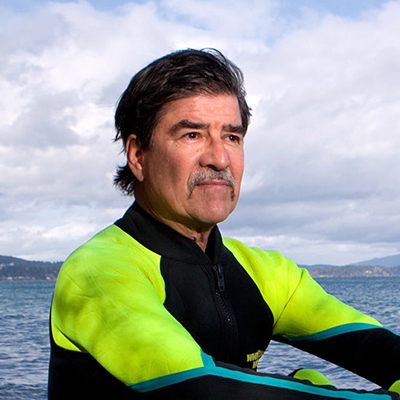Phil Dearden
About
 Philip Dearden is a Full Professor at the University of Victoria where he leads the Marine Protected Areas Research Group. His research is focused on biodiversity protection with a particular interest in protected area planning and management in the coastal tropics. Research interests range from coral reef monitoring, whale sharks, community-based conservation, marine ecotourism and marine protected area (MPA) planning to understanding the impacts of global climate change on MPAs and related communities. He has undertaken research in many countries and is currently engaged in studies on the impacts of climate change on MPAs and livelihoods in Thailand and the Philippines, poverty and protected areas in Tanzania and Ghana as well as MPA-related studies in Canada. With over 250 academic articles and 9 books to his name he is frequently called upon to advise international and national governments on conservation matters and he was the Expert Advisor to the Auditor General’s recent audit of MPAs in Canada.
Philip Dearden is a Full Professor at the University of Victoria where he leads the Marine Protected Areas Research Group. His research is focused on biodiversity protection with a particular interest in protected area planning and management in the coastal tropics. Research interests range from coral reef monitoring, whale sharks, community-based conservation, marine ecotourism and marine protected area (MPA) planning to understanding the impacts of global climate change on MPAs and related communities. He has undertaken research in many countries and is currently engaged in studies on the impacts of climate change on MPAs and livelihoods in Thailand and the Philippines, poverty and protected areas in Tanzania and Ghana as well as MPA-related studies in Canada. With over 250 academic articles and 9 books to his name he is frequently called upon to advise international and national governments on conservation matters and he was the Expert Advisor to the Auditor General’s recent audit of MPAs in Canada.
Place
The Gulf Coast of Thailand is of international biodiversity significance and contains large areas of mangroves, coral reefs, and sea grass beds which are showing signs of increasing environmental deterioration. Coastal communities have been reliant on fishing for survival since time immemorial. Fisheries are still central to the economy although increased fishing pressure has led to sharp declines in fish stocks in the region and many communities are seeking to diversify their livelihoods into tourism. Recently there has been a significant growth in marine-based tourism. Another significant change in response to environmental deterioration has been the creation of several marine protected areas (MPAs) that are ostensibly “no-take zones” for fishers. The creation of these areas with little community consultation has led to considerable conflict between park officials and the communities. These MPAs have been largely created under a traditional “fines and fences” approach by the National Parks Department. Recent changes in legislation have mandated another agency, the Department of Marine and Coastal Resources to also establish and manage MPAs. These new MPAs will adopt a more community-based approach from the outset and our research is exploring ways to establish areas that will incorporate appropriate socio-economic information to minimize socio-economic costs while achieving conservation benefits.
Research
The Marine Protected Areas Research Group (http://mparg.wordpress.com/home/projects/) at the University of Victoria (under the leadership of Dr Phil Dearden) has been working on conservation challenges on the Andaman coast for several decades. The current research programme (Project IMPAACT: Improving Marine Protected Areas on the Andaman Coast of Thailand http://projectimpaact.asia/), examines the potential impacts of future climate change on marine biodiversity and livelihoods and has 3 main components: enhancing the resilience of the MPA system, understanding coastal community livelihoods and vulnerability, and examining the current and future role of diving as an incentive-based conservation mechanism. The CCRN component adds to our understanding of the challenges posed for communities and conservation in the region by assessing economic values of reefs in the area and linking these to conservation motivations.
Key Publications
- Bennett, N.J., Dearden, P., & Kadfak, A. 2015. Community-based scenario planning: A process for vulnerability analysis and adaptation planning to social-ecological change in coastal communities”, Environment, Development and Sustainability 10.1007/s10668-015-9707-1
- Augustine S.,P. Dearden and R.Rollins (2016) ‘Are changing diver characteristics important for coral reef conservation?’ Aquatic Conservation: Marine and Freshwater Ecosystems.| DOI: 10.1002/aqc.2574
- Bennett, N., Dearden, P., & Peredo, A.M. (2015). “Vulnerability to multiple stressors in coastal communities: A study of the Andaman Coast of Thailand” Climate and Development 7(2): 124-141.
- Agyare, A, P. Dearden, G. Murray and R.Rollins (2015) Conservation in Context: Variability in Desired and Perceived Outcomes of Community Based Natural Resources Governance in Ghana” Society and Natural Resources .28: 975-994
- Reshitnyk, L., Costa, M., Robinson, C. & Dearden P (2014) Evaluation of WorldView-2 and acoustic remote sensing for mapping benthic habitats in temperate coastal Pacific waters. Remote Sensing of Environment 153: 7-23. 153, doi:10.1016/j.rse.2014.07.016
- Bennett, N.J. & Dearden, P. (2014). From Measuring Outcomes to Providing Inputs: Governance, Management, and Local Development for More Effective Marine Protected Areas. Marine Policy 50:96-110.
- Bennett, N.J., Dearden, P., Murray, G. & Kadfak, A. (2014). “The Capacity to Adapt?: Coastal Communities in a Changing Climate, Environment, and Economy on the Andaman Coast of Thailand” Ecology and Society 19 (2): 5.
- Bennett, N. and P. Dearden (2013) Why local people do not support conservation: Community perceptions of marine protected area livelihood impacts, governance and management in Thailand. Marine Policy 44: 107-116.
- Hauzer, M., P. Dearden and G. Murray (2013) The fisherwomen of Ngazidja island, Comoros: Fisheries livelihoods, impacts, and implications for management. Fisheries Research 140:28-35
- Bennett, N. and P. Dearden (2013) A Picture of Change: Using Photovoice to Explore Social and Environmental Change in Coastal Communities on the Andaman Coast of Thailand. Local Environments 18(9):983-1001


